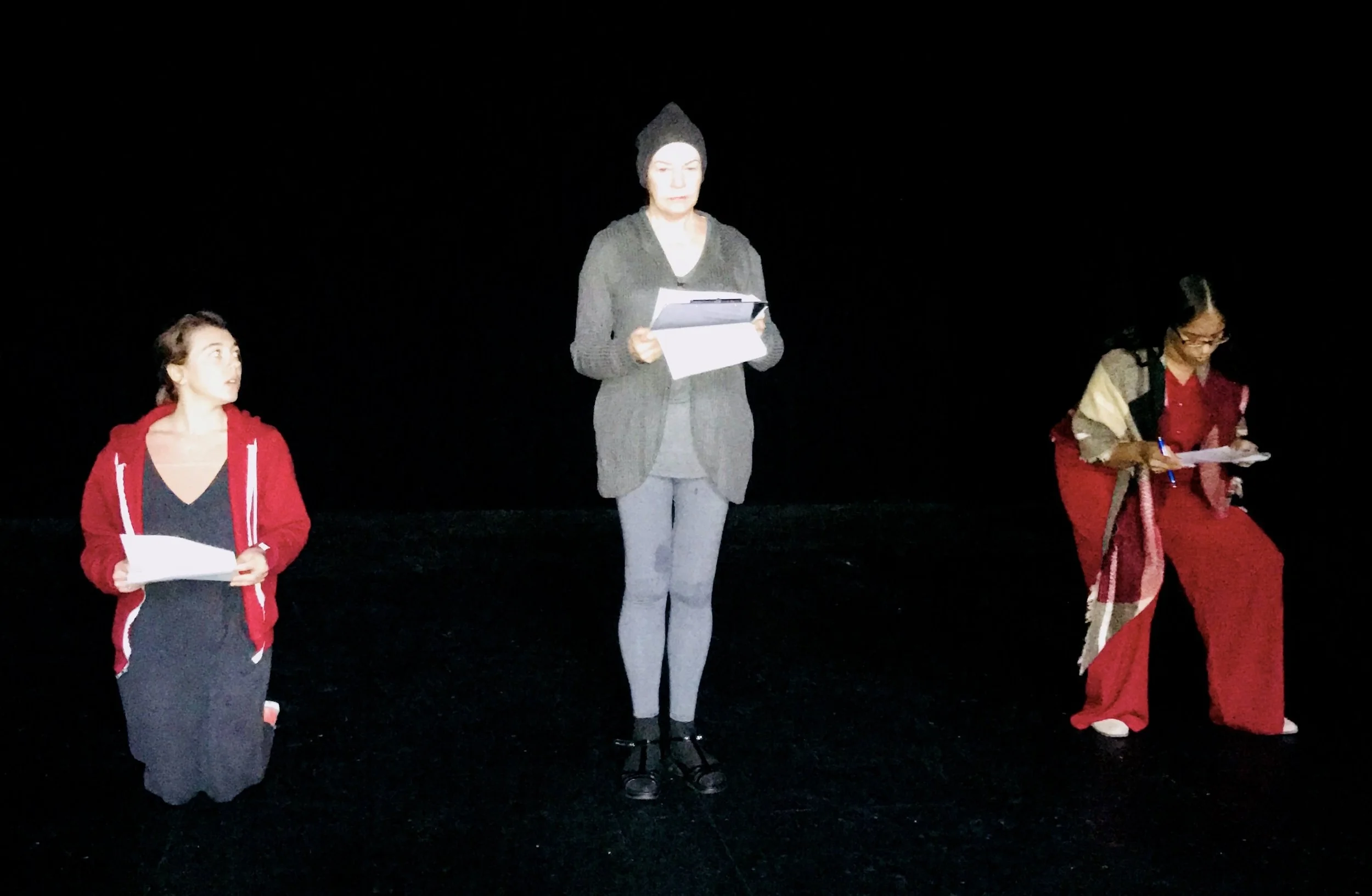Our Voices playwright GUEST BLOG FEATURE: Jane knox
“The world which men have made isn’t working. Something needs to change. To change the world, we women need first to change ourselves – and then we need to change the stories we tell about who we are. ”
From Left: Franci DuMar, Jane Knox, and Fabiola Decius in “Call Me Sheela,” Our Voices Festival 2018
Growing up I was never taught the names of my genitalia. My mother who was a nurse only called it “the crack.” Don’t forget to clean your crack, Janie, she would tell me. For decades, my genitals have been shrouded in shame. A few years ago, I had a huge breakthrough, when, watching a performance of the Vagina Monologues by Even Ensler, I realized I needed to stop being embarrassed by what is most basic to my identity as a female – my sexuality. Even when I first heard the title of this remarkable show, I felt my shame lifting, because the monologues so boldly named a woman’s anatomy. Suddenly, my crack became a body part with a respectable name. For the first time in my life, I felt freedom to begin speaking publicly about my own vagina and all its related parts.
Two years ago, I performed a stand-up comedy routine, Comedy 3, where I had the audience repeat after me out loud the beautiful words: clitoris and vulva. This past spring, I participated in Mama Gena’s Mastery course at Mama Gena’s School of Womanly Arts. Her school is all about raising the consciousness of the feminine in our patriarchal culture. Mama Gena believes women must claim our own sexuality and shift our shame-based attitude toward our bodies, and all areas of our lives, to one of pleasure. And, this is how my own consciousness has grown.
The first time I saw the carved image of an enlarged vulva on a Sheela na gig, I was fascinated with the idea that centuries ago, vulvas were honored. These stone figures were mounted at the entranceway of the most sacred places. They predominantly adorned Christian churches and castles in Ireland and elsewhere in the British Isles. How is it, I wondered, that I grew up without knowing or hearing the name of my own vulva? My overwhelming awe at this figure, and shock of the silence, inspired me to imagine the voice of a Sheela na gig come to life. I wrote a monologue from the perspective of one of the most famous of these naked statues, a 12th-century sheela na gig on the church at Kilpeck, Herefordshire, England. In my new monologue, Call Me Sheela, the carving comes to life in front of a tour group to explain that the vulva was the essence of the feminine in the ancient goddess religions. The Divine Feminine, Sheela says, resides in the vulva:
SHEELA
[YAWNS. OPENS HER EYES. STRETCHES STIFF LIMBS. NOTICES THE TOUR GROUP STARING UP AT HER.]
Oh, hello everyone. Welcome! I see it’s you again, Mr. Smarty Pants giving the tour. Excuse me, ladies and gentleman, I’m so glad you are taking this tour, but I’ve been listening to his historical presentation of me and my sisters ad nauseum. I warn you – he’s giving you the patriarchal, historical view. Would you like to know who we really are? And why we exist? And how we’ve endured here for centuries? Okay, Mr. Smarty Pants, fine, go ahead. Those of you who want to know the truth about female power, please stay! Oh, you in the pink hat – I see you’re reluctant. Embarrased perhaps? If you choose to stay, I think you’ll be glad you did. [BEAT] Now, one detail your tour guide did get right, is that I am the spirit of the most famous Sheela na gig. I’m often called Sheela at Kilpeck. But you can call me Sheela. Like all my sister Sheelas, I’m carved in stone. Obviously, we’re naked, and we’re touching our huge vulvas with both hands – Pink hat lady, breathe. Breathe! – As you can see, mine is no ordinary vulva. My vulva is so large it reaches down to my knees. Mr. Smarty Pants cannot accurately explain why our makers exaggerated our vulvas. But, I will help you understand – would someone get the pink hat lady some water please?
. . . .
It was a joy to perform a staged reading Call Me Sheela at The Our Voices Festival at Wellesley College on Sept. 30, 2018. What I found was not only that I could create this monologue, but I could reach an audience, make them laugh, and inspire them to honor this vital part of a woman’s anatomy.
Jane Knox, “Call Me Sheela” at Our Voices 2018
By being part of Our Voices this year, I realized there are women who care about showcasing the voices of women, their unique stories and points of view, and I was fortunate to find this place to express my own healing and transformation with Fabiola Decius and Franci DuMar who performed as THE CHORUS. It was the twelfth year of the festival devoted to women playwrights. I thank Kelly DuMar for her coaching and for creating the festival, because this was a way for me to have the joy and satisfaction of talking about my vulva with other women and men – and celebrating the divine feminine in the theatre.
I invite you to tell the new story about who you are as a woman. And, if you are a man reading this, I also invite you to tell a new story about who the women you are related to are, on their own terms.
©Jane Knox 2018 All rights reserved. For more information about Call Me Sheela: A Monologue with Chorus, contact Jane at knoxj1@sbcglobal.net




